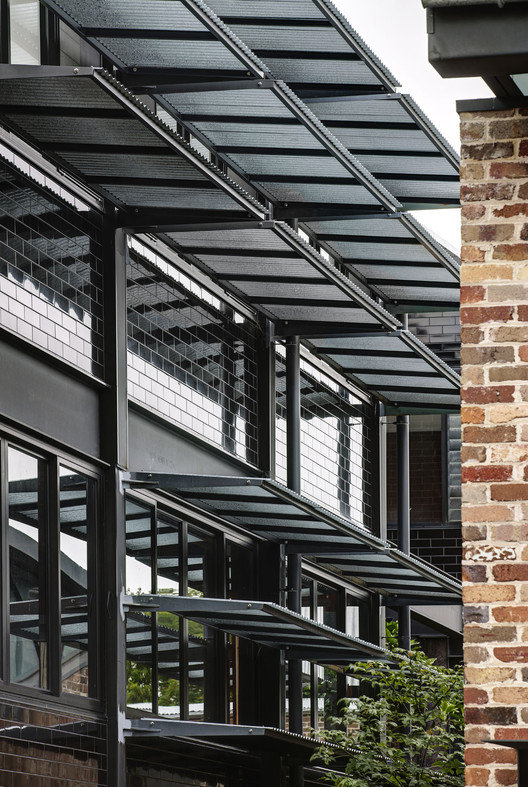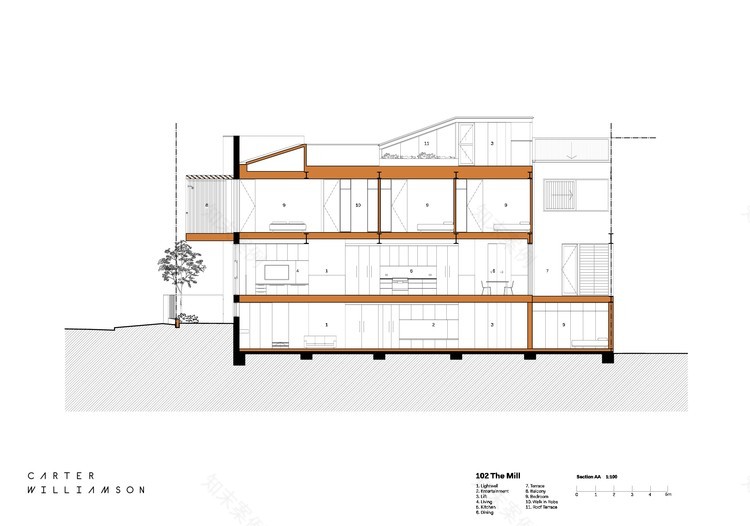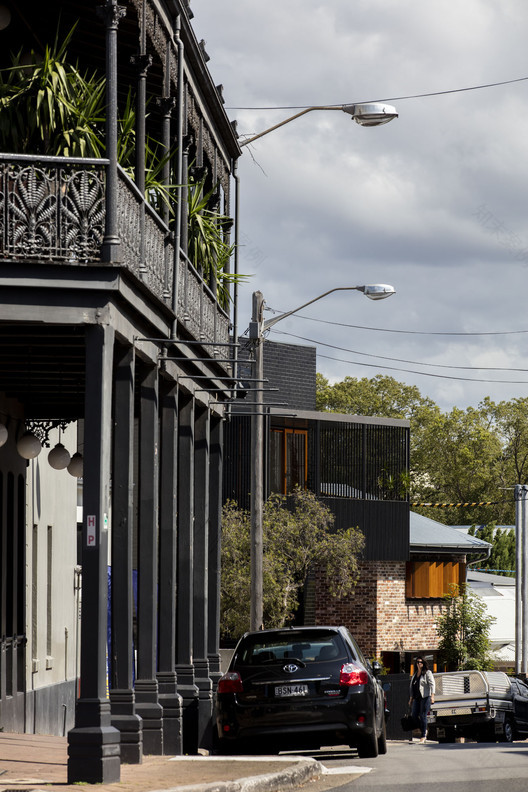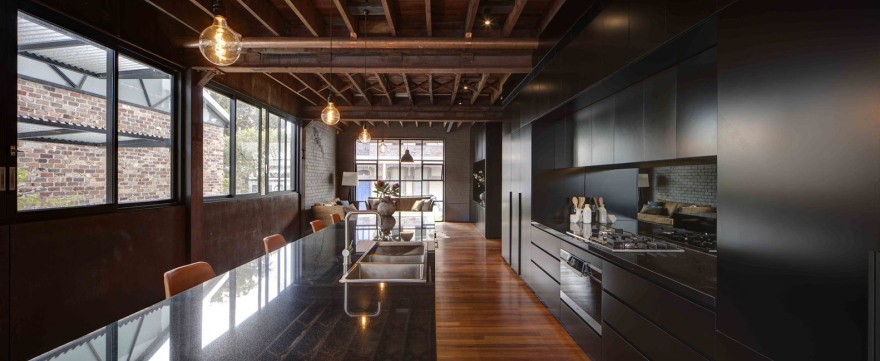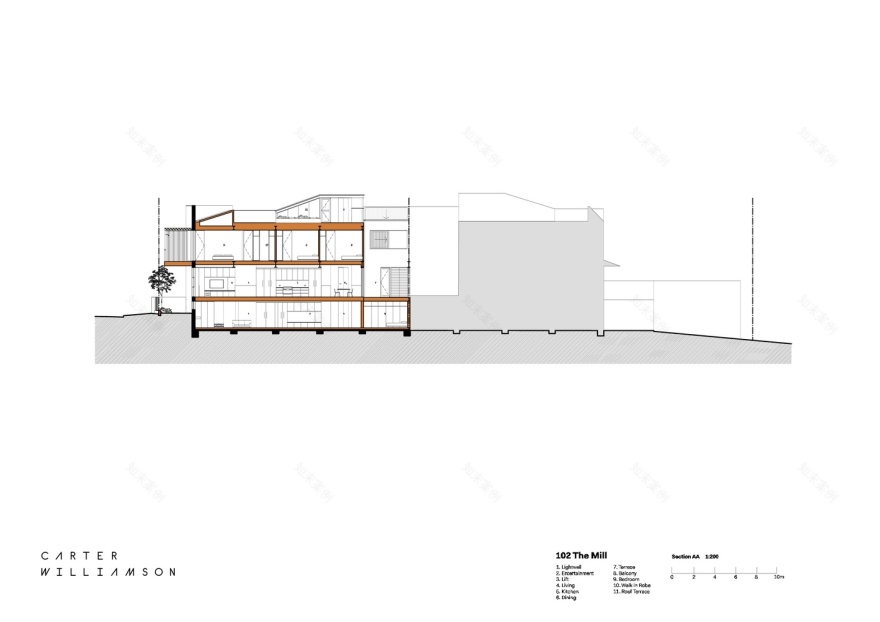查看完整案例


收藏

下载
© Brett Boardman
布雷特·博德曼
架构师提供的文本描述。102 磨坊的目标是保护巴尔曼的工业和多样化的历史,同时创造一个鼓舞人心和慷慨的家园。对我们的郊区来说,增长和变化是至关重要的,然而,我们有机会在现有工业材料的使用与敏感的新元素的选择之间取得平衡,这些新元素继续反映该地区的情况,同时适应新的用途。
Text description provided by the architects. The ambition for 102 The Mill was to preserve the industrial and varied history of Balmain while creating an inspiring and generous home. It’s vital for our suburbs to grow and change, however there is an opportunity to balance the use of existing industrial materials with a sensitive selection of new elements that continue to tell the story of the area, while adapting to new uses.
© Brett Boardman
布雷特·博德曼
我们的客户带着一份开发申请来到我们这里,批准拆除工地上的所有建筑,并建造一栋新的住宅公寓楼。然而,作为一个长期的土地所有者和居民,我们的客户想做一些特殊的事情。
Our client came to us with a Development Application on the site that approved the demolition of all structures on the site, and the construction of a new residential apartment building. However, as a long-term landowner and resident of the area, our client wanted to do something special.
© Brett Boardman
布雷特·博德曼
我们的反应是重复使用仓库的残余结构和形式,建造 4 座单独的住宅。102 磨坊就是这些转变之一。使用现有的仓库框架,我们能够创造漂亮的体积,包括一个 12 米高的空隙,照亮了四层蜿蜒的楼梯。
Our response was to re-use the remnant structure and form of the warehouses and create 4 individual dwellings. 102 The Mill is one of these transformations. Using the existing warehouse framework, we were able to create beautiful volumes including a 12m high void that brings light down four levels of winding stairs.
© Brett Boardman
布雷特·博德曼
该计划分为三个区域,从东部到西部:垂直循环、服务墙和从计划中解脱出来的居住地点。该设计策略允许使用最常用的空间,通过南北立面体验光线、空气和开放性的最大便利设施。
The plan is divided into three areas, from east to west: vertical circulation, a service wall and place for living which is freed from the plan to look outwards. This design strategy allows the most used spaces to experience maximum amenities of light, air and openness through the north, west and south facade.
© Brett Boardman
布雷特·博德曼
在 102 磨坊内部,它过去的工业生活是非常明显的。被回收的三层砖墙沿着楼梯往上走,完美地补充了在家里展示的钢梁元素。盖在楼梯上的,盖在厨房上方的;磨坊拥抱结构元素,而不是隐藏它们。
Inside 102 The Mill, its past industrial life is wonderfully evident. The recycled three storey brick wall follows the staircase up, perfectly complimenting the steel beams elements on display for all to see throughout the home. Enveloped by the staircase, uncovered above the kitchen; The Mill embraces its structural elements instead of hiding them.
Section AA 1:100AA 节 1:100
在材料被插入或替换的地方,他们已经为把仓库变成了家而做出了贡献。CarterWamson 认为砖是薄的砖,砖是薄的砖。丰富的黑色瓦片已经被用于线仓库 FA1eade,以创建用于家庭的新的复杂身份。
Where materials have been inserted or replaced, they’ve contributed to turning a warehouse into a home. Carter Williamson consider tiles as thin bricks, and bricks as thin tiles. Rich black tiles have been used to line warehouse façade to create a new sophisticated identity for the home.
© Brett Boardman
布雷特·博德曼
102 磨坊的主要可持续性方面是适应性地重用一个字符填充的仓库,该仓库被批准拆除。结构钢的再利用,包括传统的必和必拓热轧板、木地板、底层板和砖墙。通过对 102 磨机的适应性再利用,这些材料固有的内在能量继续被锁定。
The main sustainability aspects of 102 The Mill are the adaptive reuse of a character filled warehouse that was approved for demolition. The re-use of structural steel, including heritage BHP hot rolled sections, timber flooring, ground floor slab, and brick walls. Through the adaptive re-use of 102 The Mill, the embodied energy inherent in these materials continues to be locked up.
© Brett Boardman
布雷特·博德曼
102 磨坊享受北面的居住空间,一个 12 米的空间,允许自然的日光穿过所有层次的家园。同时,波纹百叶窗提供保护免受西方太阳。
102 The Mill enjoys north facing living spaces, and a 12m void that allows natural daylight through all levels of the home. While, corrugated shutters provide protection from the western sun.
© Brett Boardman
布雷特·博德曼
102 磨坊生活和呼吸它的工业过去;同情地更新从前巴曼木材厂,这座建筑通过使用自然的,可再生的材料,洞穴空间和自由流动的设计。由 carterwilliamson 执笔的这座四层建筑是建筑的典范,它让住宅感到安全可靠、自信和富有表现力、安静和反思;这是卡特万里安的哲学。有四个居民居住在其大的生活区,光滑的黑色瓷砖和天然木材的使用欢迎他们通过亮着的老钢入口,由一个高大的木制前门框架。
102 The Mill lives and breathes its industrial past; sympathetically updated from a former Balmain timber factory, the building excels through its use of natural, recycled materials, cavernous space and free-flowing design. Penned by Carterwilliamson, the four-storey building stands as an exemplary example of architecture allowing its residences to feel safe and secure, confident and expressive, quiet and reflective; a philosophy of Carterwilliamson. Accommodating four residents across its large living areas, the glossy black tiles and use of natural wood welcome them in through the lit aged steel entrance framed by a tall wooden front door.
© Brett Boardman
布雷特·博德曼
在磨坊内部,它过去的工业生活非常明显。回收的三层砖墙跟随楼梯,完美地补充了支撑楼梯的钢梁。102 磨坊的结构元素不仅是建筑上的奇迹,也是工程上的奇迹。在整个家庭中,人们都可以看到它的结构元素,它们被楼梯包围,盖在厨房上方;磨坊喜欢它的结构方面,而不是隐藏它们。
Inside The Mill, its past industrial life is wonderfully evident. The recycled three storey brick wall follows the staircase up, perfectly complimenting the patinaed steel beams supporting the staircase. As much an engineering marvel as an architectural, 102 The Mill’s structural elements are on display for all to see throughout the home, enveloped by the staircase, uncovered above the kitchen; The Mill embraces its structural aspects instead of hiding them.
© Brett Boardman
布雷特·博德曼
102 磨坊充分利用了它向北的位置,在楼梯上方环绕窗户捕捉阳光,阳光毫不费力地从楼梯上漫过。
瓦楞纸天篷不仅称赞了光滑的黑色瓷砖包围了西方面对正面,而且散发自然光进入卧室。
102 The Mill takes full advantage of its north facing location, wraparound windows atop the staircase capture sunlight which effortlessly floods down past the staircase. Corrugated tin awnings not only compliment the glossy black tiles enveloping the west facing façade, but diffuse natural light into the bedrooms. © Brett Boardman
布雷特·博德曼
自然材料的主题在更深的内部,主卧室接踵而至的高大墙壁与华丽的淡灰色扇形瓷砖,完美地辅之以装饰的钢固定物。厨房、黑色桌椅和橱柜都安然无恙地坐在原来未碰过的木天花板上。穿过厨房的是米尔斯一家的大庭院。通过从地板到天花板滑动玻璃门,庭院内衬天然石头和茧的高木板,覆盖在熟悉的黑色钢。磨坊的立面非常重视它的景观设计,它坐落在主卧室的阳台下,有一个小池塘,内衬着回收砖,周围环绕着熟悉的老钢材。
The motif of natural materials follows further inside, the master bedrooms ensuites tall walls clad with gorgeous light grey fan tiles, perfectly complimented by patinaed steel fixtures. The kitchens, black benchtop and cupboard sit with ease the original untouched wooden ceiling. Leading through the kitchen is The Mills’ large courtyard. Accessible through floor to ceiling sliding glass doors, the courtyard is lined with natural stones and cocooned in tall wood panels, capped in the familiar black steel. The Mills’ façade places utmost importance on its landscaping, set under the master bedrooms balcony sits a small pond lined in the recycled brickwork, skirted by the familiar aged steel.
© Brett Boardman
布雷特·博德曼
102.磨坊在与邻近建筑物对话时对其背景作出反应。通过保持仓库的原有高度,保持街道构图,再加上三楼阳台,并与街道对面的传统露台对话。
102 The Mill responds to its context whilst being in dialogue with neighbouring buildings. By maintaining the original height of the warehouse, the street composition is held and the additional third floor balcony reinterprets and is in conversation with the traditional terrace opposite the street.
© Brett Boardman
布雷特·博德曼
有了这些姿态,102 磨坊作为中介和过渡部分,巴曼跨越过去和现在,一个地方的工业和家庭。
With these gestures, 102 The Mill acts as a mediator and transition piece as Balmain straddles the past and present, and a place of industry and homes.
生活区是一个例子,在那里,一个哑光的黑色细木工套件形成了 Service 墙 Spine,释放了西方的 Faherade,成为一个滑动窗口的功能区。六米的厨房岛屿长凳位于空间的中间,作为一个雕塑的会议点,家人和朋友聚集在做饭、吃饭和交谈中。
The living area is a case in point, where a matte black joinery suite forms the service wall spine releasing the western façade to be a ribbon of sliding windows. The six-metre kitchen island bench sits in the middle of the space as a sculptural meeting point for family and friends to congregate over cooking, eating and conversations.
© Brett Boardman
布雷特·博德曼
通过拥抱以前的工厂生活,磨坊设法捕捉到工业巴尔曼的坚韧感觉,同情地重新定义了传统的悉尼露台房子。结果是不可避免的,与悉尼的内部环境融为一体,但作为现代澳大利亚建筑中的一颗明珠而引人注目。
By embracing its former factory life, The Mill manages to capture the gritty feel of industrial Balmain, sympathetically redefining the traditional Sydney terrace house. The result sits with an inevitability, blending in with its inner Sydney surroundings, yet striking forward as a jewel of modern Australian architecture.
102.磨坊是这样一个例子,即把现有的建筑视为一个机会,可以创造出慷慨、健壮和充满个性的家园。
102 The Mill is an example of considering existing buildings as an opportunity can result in the creation of generous, robust, and character filled home.
Architects Carter Williamson
Location Balmain, Australia
Project Team Shaun Carter, Patrick Fitzgerald, Lisa Merkesteyn
Area 420.0 m2Project Year 2018
Photographs Brett Boardman
Category Adaptive Reuse
客服
消息
收藏
下载
最近






